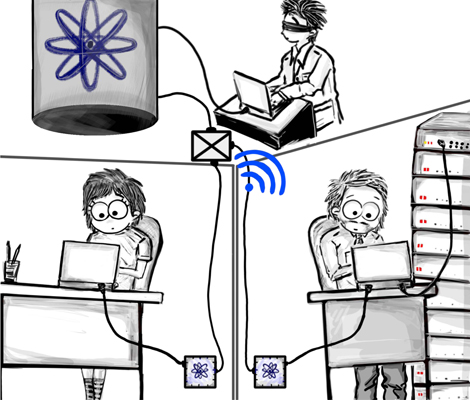In their recent publication, David DiVincenzo and Cica Gustiani report on new findings concering blind oracular quantum computation (BOQC) schemes. They present an optimized BOQC scheme which possesses the same security as BOQC and is runnable with minimal physical qubits when run on a solid-state quantum network.
Cica Gustiani worked on her PhD thesis in the group of David DiVincenzo at RWTH Aachen and moved last year to the UK in order to join Simon Benjamin’s Oxford team where she continues her research on quantum theory for early quantum computers.

Alice (left) wants to run a private oracular quantum algorithm, but she has neither a powerful quantum computer nor the knowledge needed to construct her oracle function. Oscar (right) is equipped with a device that evaluates the oracle functions, e.g. it computes stocks’ prediction, gives access to a database, or performs massive classical computations. Bob (top), who owns a powerful quantum computer, offers a quantum computing service. However, Alice and Oscar do not trust Bob’s quantum computer, and they do not risk revealing information about their computation while running it. Therefore, they execute the computation within the BOQC scheme in which Bob is blinded to the computation. All players are connected to an insecure classical channel (the wireless). Alice and Oscar still need a small quantum power—the small boxes in the bottom, making their computation power ‘almost classical’. Such power is necessary because obtaining perfect blindness with purely classical clients is still an open problem ( © Cica Gustiani and David DiVincenzo/ Quantum Science and Technology).